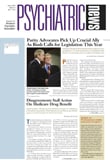The Bush Administration and members of Congress are inching forward in their efforts to pass a Medicare prescription drug benefit.
President Bush initially proposed spending $77 billion over 10 years to provide prescription drugs to low-income Medicare beneficiaries and $116 billion for unspecified Medicare modernization efforts (Psychiatric News, April 5, May 3).
In its budget resolution (H Con Res 353), the House included $350 billion for the drug benefit over the 10-year period. The Senate resolution (S Con Res 353) would also allocate $350 billion for the drug benefit and included funds for the uninsured and Medicare providers for a total of $500 billion.
In a hearing before the House Committee on Ways and Means on April 17, Tommy Thompson, secretary of the Department of Health and Human Services, said, “While we feel we can provide this benefit for less than the $350 billion proposed by the House, let me make it clear that we are committed to the principle of a prescription drug benefit rather than to a specific figure.”
The most recent projections from the Congressional Budget Office show that spending on prescription drugs during the 10-year period will reach $1.8 trillion.
According to the April AARP Bulletin, Rep. Pete Stark (D-Calif.) worked out the likely cost of a Medicare benefit based on premiums of $25 a month and a copay of 20 percent, up to an annual $2,000 out-of-pocket cap. (The benefit is similar to that received by members of Congress.)
He estimated that the benefit would cost $800 billion to $900 billion over 10 years, unless negotiated purchasing brought the cost down.
Substantial differences remain, however, between Republicans and Democrats about the structure and timing of the benefit.
Committee Chair Bill Thomas (R-Calif.) argued in favor of reliance on “private sector innovation” in delivering benefits and against a “government-run, one-size-fits-some program.”
He spoke in support of a comprehensive bill to strengthen and modernize Medicare that would address issues such as the regulatory burden, long-term solvency, “antiquated cost sharing,” payments to physicians, and the viability of the Medicare Plus Choice (M+C) program.
Thompson proposed that Medicare provide more insurance options “like those available to all federal employees.” He supported competitive bidding among companies offering Medicare benefits, but spoke against the idea that the government should take “full responsibility” for negotiating prices with the pharmaceutical companies.
Rep. Sander Levin (D-Mich.) refuted Thompson’s claim that there is enough money in the budget for a “substantial” prescription drug benefit, arguing that proposed cuts to home health care and hospital funding likely would not occur, and extension of tax cuts would eat up any funds available.
He also rebuked Thompson for holding prescription drug coverage hostage by refusing to support the addition of the benefit unless Congress agreed to other changes in Medicare.
Rep. Jerry Kleczka (D-Wis.) spoke against modeling the Medicare program on the Federal Employees Health Benefits Program, saying seniors don’t need “a potpourri of 20 plans to choose from.” He views M+C as a “total failure,” arguing that companies cancel benefits after they are offered or drop out of the program completely (Psychiatric News, January 4).
In Wisconsin, he said, one company initiated coverage at a zero deductible for hospital stays and later announced it was imposing a deductible of $365 a day.
Budget Neutrality
The issue of budget neutrality surfaced again in a discussion about the administration’s Pharmacy Plus Program. (Both Democrats and Republicans have argued against the administration’s insistence that any increases to Medicare providers must be offset by equivalent reductions elsewhere in the health budget.)
Pharmacy Plus allows states to use Medicaid waivers to provide prescription drugs to seniors with incomes up to 200 percent of the federal poverty level. However, the state’s effort would have to be budget neutral; that is, equivalent cuts in the state’s Medicaid services would be required to support the drug benefit. Only Illinois has implemented the program.
Lloyd Doggett (D-Tex.) said that the waiver would be worthless if a state were already using all its funds to meet other needs.
Need for Benefit
Thompson said, “There’s no question that 73 percent of seniors have their own prescription drug coverage.”
However, in written testimony to the Subcommittee on Health of the House Committee on Energy and Commerce on April 17, Patricia Neuman, director of the Medicare Policy Project of the Kaiser Family Foundation, said that 38 percent of all Medicare beneficiaries lacked drug coverage in the fall of 1999.
Those beneficiaries fill fewer prescriptions and face higher out-of-pocket costs than do those with coverage, she added.
Jay Cutler, J.D., director of APA’s Division of Government Relations, said, “Given the signals that some form of a drug benefit is likely, we are working to ensure that Congress does not discriminate against persons with mental illness in drug coverage. We are concerned about restrictive formularies, ‘fail-first’ requirements, and other methods of restricting access to the current generation of psychotropic medications.”
According to the April 18 Congressional Quarterly, House leaders said that they hope to move forward legislation that would reform Medicare and include a drug benefit by May 24.
The transcript of the hearing is posted at www.kaisernetwork.org/health_cast/hcast_search_archives.cfm; select “Congressional Hearings” under “Topics.” The text of the House’s budget resolutions for Fiscal 2003 can be accessed on the Web at http://thomas.loc.gov/ by searching on “H Con Res 353” and clicking on “Sec. 202. Reserve Fund for Medicare Modernization and Prescription Drugs.” At press time the Senate resolution had not yet been posted. ▪
